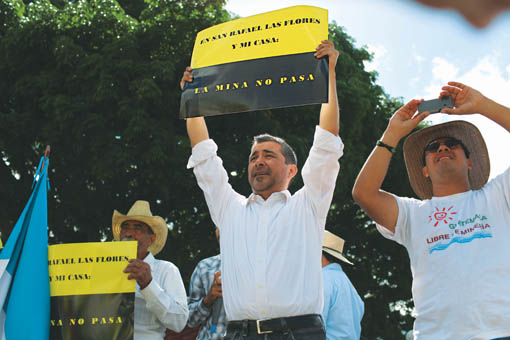On a hot Sunday morning in July 2013, the inhabitants of Piedras, a small municipality in the Colombian Andes, gathered to decide whether large-scale mining activities should be permitted in their territory.
Piedras, traditionally a rice farming community, could soon be a neighbor to one of the biggest open-pit mining projects in the world. The South African transnational AngloGold Ashanti announced plans to exploit gold reserves at La Colosa—56 miles (90 km) from Piedras and estimated to contain 24 million ounces with a current market value of $31 billion—within the next two years. The farmers in Piedras, a non-Indigenous campesino community, fear that La Colosa’s tailings dam, which would be built in the municipality, will pollute and reduce their water supply.
Last year, when the project was put to a vote through a popular referendum known as a consulta popular, or popular consultation, 99 percent of Piedras’ 5,105 eligible voters said “no.” However, the Colombian government has dismissed the results of the consultation, saying municipalities do not have the right to determine subsoil use. Meanwhile, as exploration continues at La Colosa, AngloGold Ashanti has offered jobs, improved local roads, housing, and health facilities—and even given money for the local soccer team—in an effort to gain community support.
Popular consultations like the one in Piedras have become increasingly common in Latin America in the past decade. Beginning in towns like Tambogrande, Peru, in 2002, Esquel, Argentina, in 2003, and Sipacapa, Guatemala, in 2005, communities across the region—many of them non-Indigenous—have been using this form of direct democracy to overwhelmingly reject extractive projects. In Guatemala, local communities rejected extraction projects in 74 different popular consultations between 2005 and 2012.
Popular consultations are now occurring throughout the hemisphere alongside the mechanism of consulta previa, and are gaining attention as an alternative way for communities to register their concerns about extractive projects.
International Labour Organization Convention 169 gives Indigenous and tribal peoples the right to be consulted before the adoption of any legislative or administrative decision that could affect them. In contrast, popular consultation is codified in national legislation and enables any eligible voter (including, but not limited to Indigenous and tribal peoples) to decide any issue of importance to the community. Popular consultations also differ from prior consultations in the manner in which they are carried out: while prior consultations are meant to involve a process of ongoing discussion and dialogue between the government and community, popular consultations usually involve a single yes-or-no vote by ballot.
Popular consultations can inspire civic participation in a way that traditional elections do not. In the oil-producing Colombian municipality of Tauramena—where 96 percent of 4,610 eligible voters said “no” to additional exploratory activities by Colombia´s state oil company, Ecopetrol, in 2013—more people participated in the consultation than in the regular mayoral election.
The degree to which popular consultations are considered legally binding is a source of great debate, and depends on national legislation. In Colombia, as in most of Latin America, the Constitution states that subsoil resources are owned by the national government and not by the owners of the land. In December 2013, Colombian President Juan Manuel Santos said in an interview with El Espectador that popular consultations like the ones in Piedras and Tauramena are “illegal and have no legal effect. The subsoil belongs to all Colombians. There is no room for discussion.”
Yet Colombian law (Law 134 of 1994, Article 8) says it is obligatory for national authorities to respect the results of popular consultations. The increasing use
of these consultations has fueled an intense national debate about which level of government should have the power to decide on the use of natural resources in the subsoil.
As popular and prior consultations increase, they are viewed by some as obstacles to economic development. But they may help reduce the rising number of socioenvironmental conflicts in Latin America. Such mechanisms could also provide the impetus for a resource extraction process that takes into account communities’ views of what development should look like.





